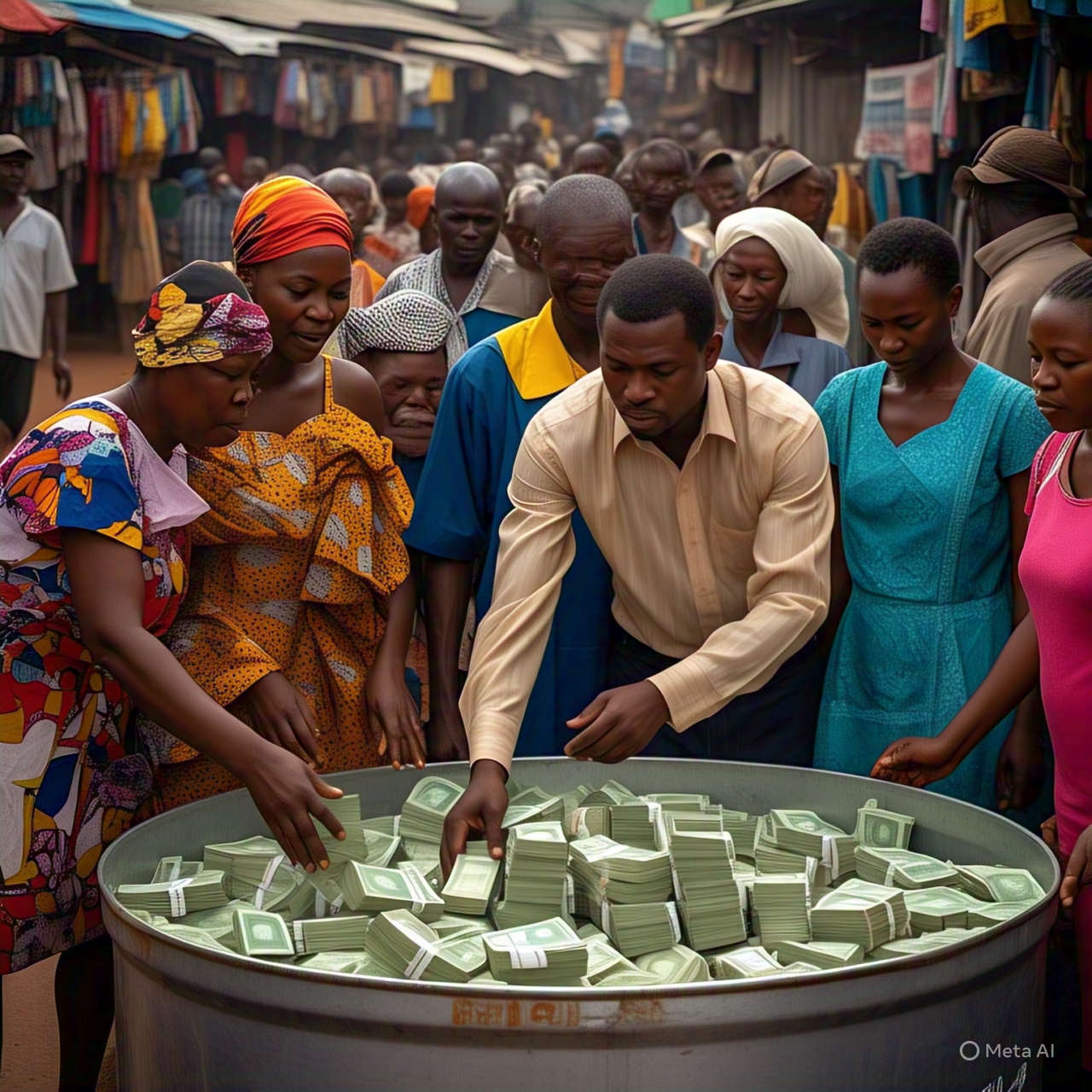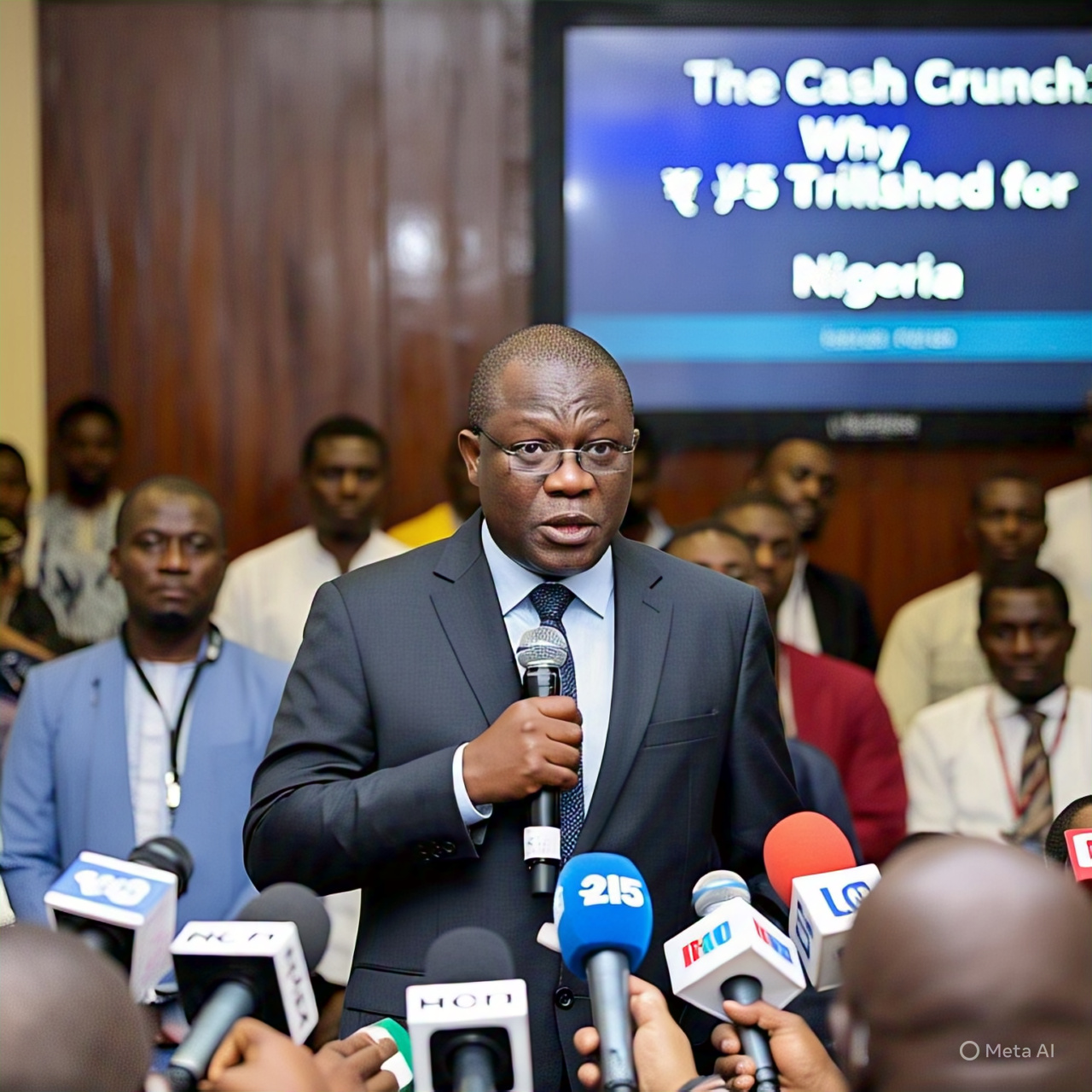IINTRODUCTION

Picture this: Nigeria’s currency in circulation drops by a staggering ₦5 trillion—a number big enough to make even the savviest economist pause. But here’s the twist: while physical cash evaporates, digital wallets are exploding. This isn’t just a financial shift; it’s a silent revolution.
The Central Bank’s policies yanked billions out of pockets and mattresses, leaving millions scrambling. Enter fintech startups, smelling opportunity like rain in a drought. They’re not just chasing profits—they’re racing to drag Nigeria’s unbanked masses (over 40 million adults) into the financial light.
Think of it as a high-stakes game: less cash, more chaos, but also more potential. Who wins? The startups turning frustration into innovation—or the people finally seen by a system that ignored them for decades? Let’s unpack how ₦5 trillion vanished… and why that absence might be Nigeria’s most powerful economic spark yet.
The Cash Crunch: Why ₦5 Trillion Vanished

You’re standing at a market stall in Lagos, your phone buzzing with a payment alert. The seller nods—no one blinks at digital transactions anymore. But rewind just two years: cash was king. So what happened?
The Central Bank of Nigeria (CBN) didn’t just nudge people toward digital money—it shoved. A controversial naira redesign in 2022 yanked old notes out of circulation, while strict cash withdrawal limits (as low as ₦20,000 per week for individuals) turned physical cash into a rare commodity. Banks ran dry. ATMs became battlegrounds. Families hoarded bills under floorboards, fearing collapse.
But here’s the kicker: the CBN wasn’t *just* fighting inflation or curbing crime (their official reasons). They were quietly rewiring a cash-addicted economy. Imagine pulling ₦5 trillion out of a system where 85% of transactions used physical notes. Chaos? Absolutely. But chaos with a purpose.
The unbanked—market traders, farmers, gig workers—had no safety net. Fintechs swooped in, not with pity, but solutions: *“No bank account? No problem. Your phone number is your wallet now.”* Apps like Opay and Palmpay became lifelines, onboarding users faster than banks could print ATM cards.
The Cash Crunch: Why ₦5 Trillion Vanished

You’re standing at a market stall in Lagos, your phone buzzing with a payment alert. The seller nods—no one blinks at digital transactions anymore. But rewind just two years: cash was king. So what happened?
The Central Bank of Nigeria (CBN) didn’t just nudge people toward digital money—it shoved. A controversial naira redesign in 2022 yanked old notes out of circulation, while strict cash withdrawal limits (as low as ₦20,000 per week for individuals) turned physical cash into a rare commodity. Banks ran dry. ATMs became battlegrounds. Families hoarded bills under floorboards, fearing collapse.
But here’s the kicker: the CBN wasn’t *just* fighting inflation or curbing crime (their official reasons). They were quietly rewiring a cash-addicted economy. Imagine pulling ₦5 trillion out of a system where 85% of transactions used physical notes. Chaos? Absolutely. But chaos with a purpose.
The unbanked—market traders, farmers, gig workers—had no safety net. Fintechs swooped in, not with pity, but solutions: “No bank account? No problem. Your phone number is your wallet now.” Apps like Opay and Palmpay became lifelines, onboarding users faster than banks could print ATM cards.
The Unseen Currency of Progress
Let’s cut through the noise: Nigeria’s missing ₦5 trillion isn’t gone —it’s been transformed. What evaporated as cash has resurfaced as something far more potent—trust in digital systems. For decades, the unbanked were dismissed as “too difficult” to reach. Now, their phones buzz with transactions, loans, and savings—tools once reserved for the urban elite.
This isn’t just about money. It’s about dignity. A woman in Enugu who once hid her earnings in a clay pot now tracks her business growth on an app. A fisherman in Rivers State sends his daughter to school with fees paid via USSD. The fintech revolution isn’t flawless—fraud, outages, and policy missteps linger—but it’s undeniably human.
The CBN’s gamble stripped away the illusion that cash was permanent. In its place? A scramble to innovate, adapt, and include. Nigeria’s story is a warning and a beacon: financial exclusion isn’t solved by pity or policy alone. It takes chaos, courage, and a QR code on a market stall.
So, where does ₦5 trillion go when it vanishes? Into the hands of those who never mattered… until they did.
Epilogue: The Silent Players – What Data Won’t Tell You
Let’s get real: behind every statistic about Nigeria’s cashless revolution, there’s a person rewriting their story.
Take Ahmed, a keke driver in Sokoto. Before 2025, he stored his daily earnings in a rusted biscuit tin. Now, he sends 80% of his income to his wife’s mobile wallet—cutting out middlemen who’d “lose” his cash. Or Funke, a pepper seller in Ibadan, who discovered her $0.50 daily savings in a fintech app could grow into a ₦50,000 emergency fund in six months.
These aren’t outliers. They’re the invisible fuel powering Nigeria’s fintech boom. The systems talk about “financial inclusion,” but the truth is messier: trust is built in increments—₦100 transfers, failed transactions forgiven, agents who hike fees but show up.
The CBN’s missing ₦5 trillion? It’s here: in the 17-year-old coding whiz building fraud detection tools for Opay, the grandmothers teaching grandchildren to “press *737# to pray for money,” and the collective sigh of a nation learning to bet on pixels over paper.
Final Note: Your Voice in the Story

This isn’t just Nigeria’s revolution—it’s yours. Whether you’re a tech founder in San Francisco, a policymaker in Jakarta, or a student in Lagos, this shift matters.
What’s your role?
- For innovators: Nigeria’s chaos-to-innovation blueprint is a masterclass in agile problem-solving.
- For skeptics: The risks are real, but so is the proof that exclusion can be dismantled faster than we thought.
- For the rest of us: Every time you tap “send” instead of handing over cash, you’re voting for what comes next.
The ₦5 trillion question isn’t where the money went—it’s who gets to shape the future. Spoiler: It’s not just bankers in suits anymore.
CONCLUSION
Nigeria’s missing ₦5 trillion isn’t a void—it’s a vacuum pulling the future forward. The dramatic drop in physical currency didn’t just disrupt the economy; it exposed the raw nerve of financial exclusion and forced a reckoning. Fintechs, once niche players, became frontline responders, turning policy-induced chaos into a catalyst for inclusion.
But let’s be clear: this isn’t a fairy tale. For every farmer now saving digitally, there’s a trader battling network glitches. For every fraud-resistant algorithm, there’s a grandmother wary of “invisible money.” The revolution is messy, unequal, and unfinished. Yet, it’s undeniably alive —a testament to what happens when desperation meets innovation.
The CBN’s gamble achieved something unintended: it proved that trust, not cash, is the real currency. When 40 million unbanked Nigerians began moving money through apps and codes, they revealed a truth louder than any policy paper: exclusion thrives in comfort. Disrupt the comfort, and you disrupt the status quo.
So, where does this leave us? The ₦5 trillion hole in circulation isn’t a loss—it’s a tunnel. On the other side lies a Nigeria where financial power isn’t hoarded in vaults or mattresses, but pulsates in the hands of those long ignored. The question isn’t whether cash will vanish, but who gets left behind if they cling to it.
0 comments
Leave a reply
Please login to post a comment.






